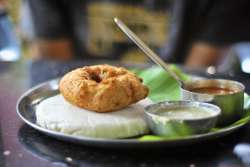World Idli Day: Did you know that this beloved dish did not originate in India?
On World Idli Day, let's learn where did our favourite dish come from.

Today is World Idli Day, so we’ll talk all we know about Idlis. This beloved dish is one of the most relished ones among the Indians, especially the ones residing below the Tropic of Cancer. Idli is timeless and it is widely popular in India. But here’s one shocker for you. What if we say you’re wrong if you thought Idli originate in India? If we’ll say that Idlis were brought to Southern India by Arab settlers, then it might raise few eyebrows. But the truth is a truth, it cannot be suppressed for long. Let’s read what Food Historian K.T. Acharya has to say about Idli and its origination.
According to K.T. Acharya, Idli came to India around 800-1200 CE from the present day Indonesia. A part of the country was then ruled by the Hindu kinds belonging to the Shailendra, Isyana and Sanjaya dynasties. If you look at the recipe of Idli, it is very similar to Kedli which is cooked in Indonesian household.
Acharya also told that a form of Idli known as Iddalage is mentioned in a 920 CE Kannada language work, Vaddaradhane. In Sanskrit Manasollasa written by Kind Someshvara III in 1130 CE, similar recipes have been found. It talks about a recipe called Iddarika. However, the three ingredients of modern Idli making aren’t found in these references.
Another Food Historian Lizzie Collingham debated these claims by K.T. Acharya. According to the reference available at the Al-Azhar University Library in Cairo, Collingham suggested that Arab traders in the Southern belt brought Idli when they married and settled down. According to the Encyclopaedia of Food History, edited by her and TV chef Gordon Ramsay and Seed to Civilisation- The Story of Food by Heiser Charles B, the Arab settlers were very strict in their food preferences. They relied on halaal food. They started preparing rice balls as a safe option, to avoid a discrepancy. These rice balls were flattened and eaten with tasteless coconut gravy. However, these rice cakes are said to taste different than the Idlis we have today.
But despite the studies suggesting that Idlis is not an Indian dish, it is one of the most popular preparations in India. In fact, many more variants to Idlis have been introduced over these years. After reading this, let’s celebrate the World Idli Day with a platter of Rawa Idlis with coconut chutney.